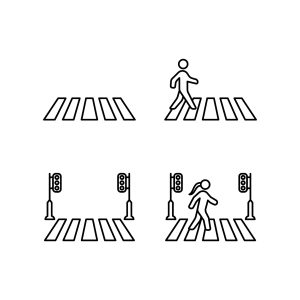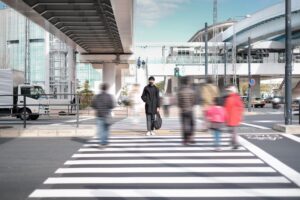How To Make A Zebra Crossing Accident Claim
By Cat Reeves. Last Updated 5th January 2024. This guide will discuss when a zebra crossing accident claim can be made. We will review the eligibility criteria for a personal injury claim, as well as evidence that can be collected to support a case.
As vulnerable road users, there are many ways in which a pedestrian could be hurt by another road user when at a zebra crossing. Later in the guide, we will look at examples of the causes of zebra crossing accidents. We also discuss the duty of care road users owe one another and the legislation they must adhere to.
Furthermore, we talk you through compensation which could be claimed for the pain and suffering, as well as financial losses, caused by a zebra crossing injury.
Our guide will then discuss how our panel of No Win No Fee solicitors can aid in the process of presenting a claim and seeking personal injury compensation.
To get a free consultation from our advisors or to learn more about road traffic accident compensation claims, please:
- Start a live chat conversation at the bottom of the page
- Enquire about a claim online
- Call 020 3870 4868

How To Make A Zebra Crossing Accident Claim
Select A Section
- Could I Make A Zebra Crossing Accident Claim?
- Causes Of Zebra Crossing Accidents
- Proving A Driver Caused Your Zebra Crossing Accident
- Estimated Payouts For Pedestrian Zebra Crossing Accidents
- Make A No Win No Fee Zebra Crossing Accident Claim
- Further Guidance On Pedestrian Crossing Accidents
Could I Make A Zebra Crossing Accident Claim?
Like any personal injury claim, a zebra crossing accident claim must meet certain eligibility criteria to be considered valid. You must show that:
- Another road user owed you a duty of care;
- There was a breach of their duty; and
- The subsequent accident caused by the breach meant you experienced harm that was either physical, mental, or both.
Furthermore, a personal injury claim must be started within three years of the accident. This requirement is set out by the Limitation Act 1980, though the Act does note that exceptions apply in certain cases.
If you are unsure what time limit may apply to you, and whether you’re eligible to seek compensation, please call our advisors using the number above.
Rules For Zebra Crossings
Road users’ duty of care is applied by the Road Traffic Act 1988. This duty requires road users to take reasonable measures to ensure the safety of others while using the road.
The Highway Code guides road users on their different responsibilities, as well as providing numerous rules backed by law that must be followed. This includes key information on the use of zebra crossings.
Firstly, Rule 19 of the Highway Code advises pedestrians to give traffic plenty of time to stop when waiting at a zebra crossing and to walk once the road is clear or traffic has stopped from both sides.
Above all, Rule 204 notes that pedestrians are one of the most vulnerable road user, and those who could cause the greatest harm are most responsible for reducing the threat they pose to others.
One zebra crossing rule the Highway Code applies is Rule 195, which outlines that motorists must give way if a pedestrian is crossing the road.

Learn About The Personal Injury Claims Process
Causes Of Zebra Crossing Accidents
As the previous section shows, motorists bear much responsibility towards pedestrians, and a breach of their duty of care could lead to accidents and harm.
Some examples of this include:
- A HGV driver failed to spot you crossing and struck you while you were crossing. As a result, you suffer a traumatic brain injury or head injury.
- You sustain a forearm fracture because a motorist was not paying attention and you were hit by a car while crossing.
- You suffer a spinal injury because a car driver was using their phone when driving and didn’t see you on the crossing.
However, it is important to note that not all accidents involving a pedestrian being injured at a zebra crossing will form the basis of a valid personal injury claim. It needs to be proven that a breach of another road user’s duty of care resulted in the pedestrian becoming injured.
Zebra Crossing Accidents Caused By Untraced Or Uninsured Drivers
Under Section 170 of the Act 1988, drivers must stop and exchange information at the scene of an accident if a person, other than the driver, suffers a personal injury, or there has been any property or vehicle damage.
Generally, when a personal injury claim is made after an accident on the road, this is done against the at fault driver whose insurance would cover the compensation. However, if the accident is caused by an uninsured driver or a driver who has fled the scene, such as in a hit and run incident, a claim would instead be made through the Motor Insurers’ Bureau (MIB). To do so, you would still need to prove that the other road user caused you harm as a result of breaching their duty of care.
Please contact our advisors if you have been injured in a zebra crossing accident involving an uninsured or untraced driver and need guidance. They can offer further guidance on the steps you could potentially take to begin a zebra crossing accident claim and seek compensation.
Proving A Driver Caused Your Zebra Crossing Accident
A zebra crossing accident claim can be supported by relevant evidence which shows a connection between a road user’s breach of duty causing the accident, and your subsequent injuries. Evidence can include:
- Footage captured by CCTV or traffic cameras, a personal device, like your phone or a driver’s dash cam.
- A police report.
- Medical records that you can request during treatment, such as X-rays.
- Witness contact information. Witnesses could be called to provide a statement that shares their account of what happened.
A solicitor from our panel can help to gather evidence during the claims process. Please speak with an advisor if you would like to know more about what our panel of solicitors can do for you.

Zebra Crossing Accident Claims
Estimated Payouts For Pedestrian Zebra Crossing Accidents
The table below gives guideline compensation brackets for different injuries. The figures come from the Judicial College Guidelines (JCG), a document legal professionals can use along with medical evidence to value the general damages portion of your potential settlement.
General damages is one of the heads of claim that accounts for physical pain and mental suffering arising from being hurt.
This table should not be seen as a guaranteed projection of compensation that would be given in a zebra crossing accident claim because settlements typically vary.
Guideline Compensation Brackets
| Injury | Severity | Compensation | Notes |
|---|---|---|---|
| Multiple Serious Injuries And Special Damages | Serious | Up to £1,000,000+ | A combination of multiple serious injuries alongside financial losses, such as lost earnings, and the cost of mobility aids and home adjustments. |
| Injuries Involving Paralysis | Paraplegia | £219,070 to £284,260 | Age and life expectancy, the presence and extent of pain, mental well-being, degree of independence and also the impact on sexual function factor into the compensation awarded. |
| Head | Moderately Severe | £219,070 to £282,010 | The affected person will be very seriously disabled, as well as needing constant care. Disabilities can either be physical or cognitive. |
| Back | Severe (i) | £91,090 to £160,980 | The most severe injuries, involving nerve root and spinal cord damage with very serious consequences. |
| Chest | Traumatic injury to the chest, lung(s), and/or heart | £65,740 to £100,670 | Permanent damage, functional impairment and physical disability are caused. There is also a reduced life expectancy. |
| Leg | Severe (ii) | £54,830 to £87,890 | Very serious leg injuries, where the injured person will need mobility aids and/or have permanent mobility issues for the rest of their life. |
| Neck | Severe (iii) | £45,470 to £55,990 | Significant and permanent disability, resulting from fractures, dislocations, severe soft tissue damage and/or ruptured tendons. |
| Wrist | Significant Permanent Disability | £24,500 to £39,170 | Some useful movement remains after the injury. |
| Arm | Less Severe | £19,200 to £39,170 | While there will have been disabilities of a significant degree, recovery is either expected or has already happened. |
| Back | Moderate (i) | £27,760 to £38,780 | Examples of injuries included in this bracket are a compression or crush fracture to the lumbar vertebrae. |
What Special Damages Could You Claim?
You could also claim special damages, the other possible head of claim that can make up a settlement. This compensates for the financial losses caused by an injury. By providing evidence of expenses like receipts or payslips, costs you could claim reimbursement for include, for instance:
- A loss of earnings
- Medical costs
- Travel costs
- The cost of home adaptations
For more information on the compensation that you could receive following a successful claim, please get in touch on the number above.
Make A No Win No Fee Zebra Crossing Accident Claim
If you are eligible to make a claim for compensation following an accident at a zebra crossing, one of the expert personal injury solicitors from our panel may be able to help.
Our panel works on a No Win No Fee basis through Conditional Fee Agreements (CFAs). This means that when you start your zebra crossing accident compensation claim with a solicitor from our panel, they won’t charge you for their work upfront or as the claim is ongoing. Likewise, if your claim doesn’t succeed, you won’t pay a fee for their services.
If your claim succeeds, then your solicitor will be due a success fee. This fee is taken directly from your compensation as a small percentage. However, this percentage is capped by law. This helps to make sure that you keep the majority share of what you receive.
Contact Our Team To Learn More
If you’d like to find out whether a No Win No Fee solicitor from our panel could help you claim compensation for an accident at a pedestrian crossing, contact our team of advisors today. They can answer any questions you might have about the claims process and may be able to connect you with a solicitor from our panel. To get started:
- Call us on 020 3870 4868
- Use the live chat feature
- Contact us online
Further Guidance On Pedestrian Crossing Accidents
We have more useful guides related to road traffic accidents, including the below:
- A guide to car accident claims.
- More information on the road traffic accident claims process.
- Guidance on what to do as a cyclist hit by a car.
Lastly, here are some useful resources for you to look at.
- National Highways – how to request traffic camera footage.
- MIB – More information about making a claim.
- GOV – Highway Code guidance for pedestrians.
Thank you for reading our guide on making a zebra crossing accident claim. If you have any other queries, please give our team a call.





